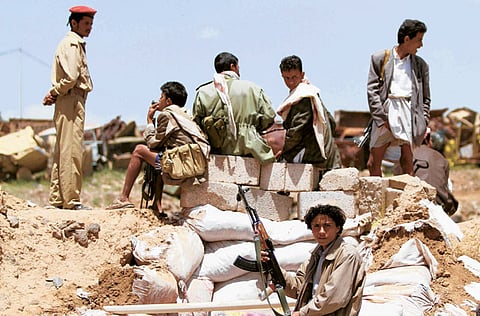UN envoy warns nation of serious security challenges
Lawlessness and criminality prevail in some areas

Sana'a: Two months after a new president took power in Yemen, replacing veteran Ali Abdullah Saleh, the UN envoy to the unrest-hit country cautioned that the worst may not be over, though a transition plan remains on track.
In an interview with AFP in Sana'a, Jamal Benomar also said Yemen is still facing serious security challenges and that progress on this front is still "very relative".
The implementation of UN-backed Gulf-brokered plan that ousted Saleh is "on track," Benomar said, but warned there is "no indication that the worst is over or no indication that Yemen is turning the page."
Armed militias and divided forces still roam the streets of the capital with AK-47 rifles slung on their shoulders. And though much of the roadblocks and barricades on Sana'a's main roads have been dismantled, the armed men have moved "to side streets and have stored munitions in buildings," said Benomar.
He added that "lawlessness and criminality prevail in some parts of the country," not only in the more distant provinces in the south and the east, where Al Qaida linked militants are gaining ground, but even to some degree in Sana'a, the seat of the new government.
Justice on hold
In the capital, police officers are few and far between. Traffic lights don't work and the streets are littered with garbage. The country's courts have been on strike for the past three months, putting any and all forms of justice on hold.
The national electricity grid as well as oil and gas pipelines are regularly attacked, disrupting the flow of power and fuel to Sana'a and other cities.
Unless the government makes progress and begins to deliver some basic services soon, Benomar cautioned, the people will start to "question its credibility and legitimacy," especially considering the escalating humanitarian crisis.
With a difficult security environment and no real signs of economic recovery, "the people are experiencing extreme hardship," said Benomar.
Yemen was already the poorest country in the Arab world at the end of 2010. And then the Arab Spring happened and Yemenis, like their Egyptian, Tunisian, Libyan and Syrian counterparts revolted against decades of autocracy, corruption and economic stagnation.
The uprising, however, turned violent, hijacked by the country's opposing political, tribal and military leaders, leaving hundreds dead and many thousands more wounded before Saleh signed the UN-backed and Gulf-sponsored power transition agreement that paved the way for February's presidential poll.
Alarming statistics
The latest UN statistics are alarming and point to 10 million Yemenis that are food insecure. Seven million of them are "severely food insecure" said Benomar, adding that some 700,000 children "could die this year from malnutrition if nothing is done immediately."
The streets of Sana'a are packed with children, barefoot and begging. Men line the sidewalks, many unemployed, chewing on the local narcotic known as Qat. Buildings destroyed and damaged in the fierce clashes that rocked this city last year stand deserted, the businesses in them remain shut and the residents who moved out during the fighting have not returned.
Sign up for the Daily Briefing
Get the latest news and updates straight to your inbox



